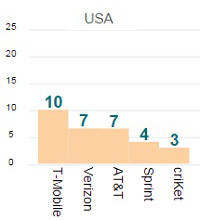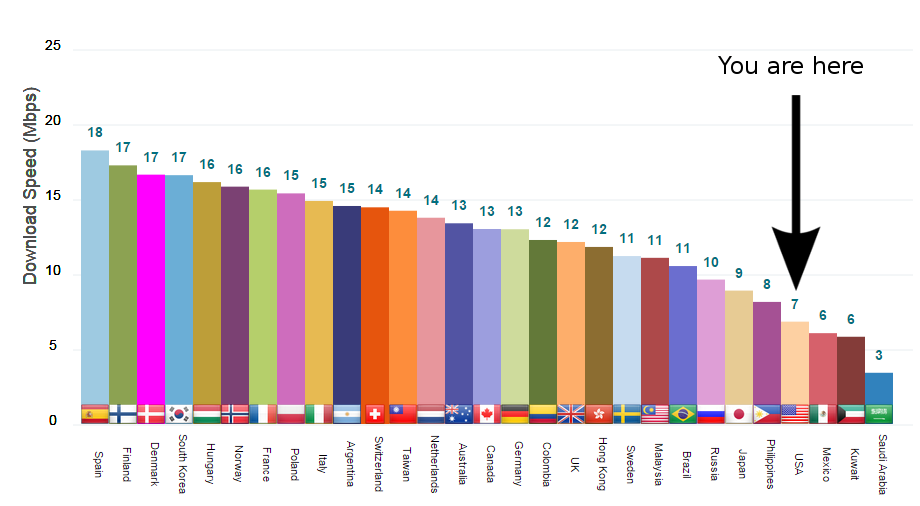US LTE Ranks Low on Speed, High on Use
March 15, 2015/
LTE is awesome. I love nothing more than to see that little tiny green 4G next to my signal bars to let me know that I can browse, stream and do just about anything on my phone. But, what if I told you that despite the fact that you’re in one of the most LTE-connected nations in the world, your “super fast LTE” connection is, in global terms, not super fast at all?
According to a new report released by OpenSignal surveying the speed and amount of time customers in 29 countries spent connected to LTE, the US is ranked only 26th in terms of download speeds. The country with the fastest download speed is Spain, with an average of 18 Mbps and the slowest is Saudi Arabia with an average of 3 Mbps. The United States has an average of 7 Mbps.
In better news, the US was actually ranked pretty high as far as time spent connected to LTE networks, and is ranked sixth behind South Korea (which is the No. 1 ranked country), Japan, Kuwait, Hong Kong and the Netherlands. The least-connected country is Argentina.
 Now, before you argue that Cricket totally threw the speeds down, keep in mind that Sprint’s speeds weren’t much better. Out of the five US companies sampled, T-Mobile actually ranked the highest in terms of download speeds with an average of 10Mbps. AT&T and Verizon both were at 6.5 Mbps, Sprint was at 4 Mbps and Cricket bottomed out at 2.9 Mbps.
FierceWireless also suggested in their article that the US’s speeds suffered partially due to the larger size of the country compared to the six countries that ranked above it, and that Sprint and Cricket together brought down our average quite a bit. The article also argues that the sheer volume of people using the US LTE network likely also ‘”degrades US network quality relative to other countries with a smaller number of LTE customers.” While I’m not an expert on LTE, it does make a bit of sense.
What surprised me the most was T-Mobile beating Verizon and AT&T as far as speed goes. Between all of the LTE the company has deployed in recent months and the fewer number of customers I suppose it makes sense. Still, I was a little startled to see that. Good job, T-Mobile!
Anyway, if you want to take a look at the full report and all the pretty graphs, you can read it here.
]]>
Now, before you argue that Cricket totally threw the speeds down, keep in mind that Sprint’s speeds weren’t much better. Out of the five US companies sampled, T-Mobile actually ranked the highest in terms of download speeds with an average of 10Mbps. AT&T and Verizon both were at 6.5 Mbps, Sprint was at 4 Mbps and Cricket bottomed out at 2.9 Mbps.
FierceWireless also suggested in their article that the US’s speeds suffered partially due to the larger size of the country compared to the six countries that ranked above it, and that Sprint and Cricket together brought down our average quite a bit. The article also argues that the sheer volume of people using the US LTE network likely also ‘”degrades US network quality relative to other countries with a smaller number of LTE customers.” While I’m not an expert on LTE, it does make a bit of sense.
What surprised me the most was T-Mobile beating Verizon and AT&T as far as speed goes. Between all of the LTE the company has deployed in recent months and the fewer number of customers I suppose it makes sense. Still, I was a little startled to see that. Good job, T-Mobile!
Anyway, if you want to take a look at the full report and all the pretty graphs, you can read it here.
]]>
Why are we so slow??
Good question! While the acutal report doesn’t really go into why countries are faster than others, it does break down the carriers that were measured and ranks them. For the US, OpenSignal included T-Mobile, AT&T, Verizon, Sprint and, oddly enough, Cricket in its measurements. And, basically, Cricket and Sprint killed our numbers. In fact, of all the carriers worldwide they sampled, Cricket has the slowest download speed. Check it out:
- While Cricket wasn’t bad in terms of time spent connected, it is the lowest in terms of download speed.
 Now, before you argue that Cricket totally threw the speeds down, keep in mind that Sprint’s speeds weren’t much better. Out of the five US companies sampled, T-Mobile actually ranked the highest in terms of download speeds with an average of 10Mbps. AT&T and Verizon both were at 6.5 Mbps, Sprint was at 4 Mbps and Cricket bottomed out at 2.9 Mbps.
FierceWireless also suggested in their article that the US’s speeds suffered partially due to the larger size of the country compared to the six countries that ranked above it, and that Sprint and Cricket together brought down our average quite a bit. The article also argues that the sheer volume of people using the US LTE network likely also ‘”degrades US network quality relative to other countries with a smaller number of LTE customers.” While I’m not an expert on LTE, it does make a bit of sense.
What surprised me the most was T-Mobile beating Verizon and AT&T as far as speed goes. Between all of the LTE the company has deployed in recent months and the fewer number of customers I suppose it makes sense. Still, I was a little startled to see that. Good job, T-Mobile!
Anyway, if you want to take a look at the full report and all the pretty graphs, you can read it here.
]]>
Now, before you argue that Cricket totally threw the speeds down, keep in mind that Sprint’s speeds weren’t much better. Out of the five US companies sampled, T-Mobile actually ranked the highest in terms of download speeds with an average of 10Mbps. AT&T and Verizon both were at 6.5 Mbps, Sprint was at 4 Mbps and Cricket bottomed out at 2.9 Mbps.
FierceWireless also suggested in their article that the US’s speeds suffered partially due to the larger size of the country compared to the six countries that ranked above it, and that Sprint and Cricket together brought down our average quite a bit. The article also argues that the sheer volume of people using the US LTE network likely also ‘”degrades US network quality relative to other countries with a smaller number of LTE customers.” While I’m not an expert on LTE, it does make a bit of sense.
What surprised me the most was T-Mobile beating Verizon and AT&T as far as speed goes. Between all of the LTE the company has deployed in recent months and the fewer number of customers I suppose it makes sense. Still, I was a little startled to see that. Good job, T-Mobile!
Anyway, if you want to take a look at the full report and all the pretty graphs, you can read it here.
]]>
Posted in News

